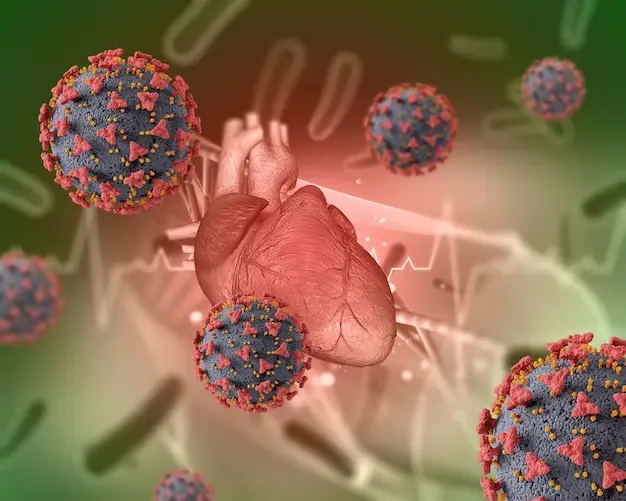Preventive Healthcare
Covid 19 Leads to an Increase in Heart Attacks
33349 Views
0

The novel coronavirus, SARS-CoV-2, responsible for COVID-19, has been linked to an increased risk of sudden heart attacks. It is being said that after COVID-19, sudden heart attacks have increased as it can directly damage heart cells, leading to inflammation and scarring, weakening the heart and increasing the risk of irregular heartbeats and heart attacks. Additionally, the virus can trigger a systemic inflammatory response, damaging blood vessels and raising the risk of blood clots. This can obstruct blood flow to the heart, causing a heart attack. Therefore, people who have had COVID-19 are more likely to experience heart attacks after COVID in the weeks or months after infection, even if they were relatively healthy beforehand.
Factors like age, underlying heart conditions, obesity, diabetes, high blood pressure, and smoking also contribute to this risk. Therefore, to mitigate the risk of heart attacks after COVID-19, vaccination, a healthy lifestyle, managing underlying risk factors, and prompt medical attention for symptoms are crucial. While the risk of heart problems after COVID remains relatively low, awareness and preventive measures are essential.
Why Severe COVID Patients Should Avoid Overwork and Overexercise?
Severe COVID-19 patients should avoid overwork and overexercise due to the significant impact of the virus on the body's various systems, particularly the lungs, heart, and overall energy levels. Engaging in strenuous activities or prolonged work during recovery can hinder healing and increase the risk of complications.
- Impact on Lungs
COVID-19 can leave behind scarring and inflammation in the lungs, leading to reduced lung capacity and difficulty breathing. Overexertion strains the respiratory system, making breathing harder and potentially exacerbating lung damage.
- Heart Strain
Severe COVID-19 can weaken the heart muscle and increase the risk of arrhythmias (irregular heartbeats). Overexerting the heart during recovery can worsen these conditions and lead to further complications, such as heart failure or heart attacks after COVID.
- Immune System Strain
The immune system works hard when the body fights a severe infection like COVID-19. Overexertion can further strain the immune system, making it harder for the body to combat the virus effectively.
- Energy Conservation
The body needs energy to recover from illness. Overworking or overexercising can divert essential energy resources from the immune system and the healing process, prolonging recovery.
- Fatigue and Energy Depletion
COVID-19 can cause persistent fatigue and weakness even after recovery. Engaging in strenuous activities or overwork can deplete energy reserves, prolong recovery, and make it more challenging to perform daily tasks.
Increased Risk of Complications
Overwork and overexercise can increase the risk of complications, such as:
- Myocarditis: Inflammation of the heart muscle can further weaken the heart and disrupt its rhythm.
- Pulmonary Embolism: Blood clots travel to the lungs, causing shortness of breath and chest pain.
- Post-COVID Syndrome: A set of long-term symptoms that can persist for months or even years after COVID-19 infection.
Recommendations for Severe COVID Patients
Severe COVID-19 patients should gradually reintroduce physical activity and work under the guidance of a healthcare provider. A gradual approach allows the body to adapt and recover without causing setbacks or complications.
- Gradual Exercise: Start with low-intensity activities, such as walking or gentle stretching, and gradually increase the duration and intensity as tolerated.
- Listen to Your Body: Rest when needed and avoid pushing yourself too far. Pay attention to signs of fatigue, shortness of breath, or chest pain.
- Prioritise Recovery: Focus on regaining strength and energy before resuming strenuous activities or prolonged work.
- Regular Check-ups: Consult your healthcare provider regularly to monitor your progress and address concerns.
- Mental Well-being: Prioritise mental health and relaxation techniques to manage stress and promote overall well-being.
Remember, recovery from severe COVID-19 is a process that takes time and patience. Working or overexerting yourself can help your progress and increase the risk of complications. Prioritise your health, listen to your body, and gradually reintroduce activities as tolerated under the guidance of your healthcare provider.
Is COVID-19 Behind Rising Heart Attacks?
The increase in heart attacks due to COVID-19 is a complex and evolving topic. While the primary concern with COVID-19 and sudden heart attacks has been its respiratory impact, as the emerging evidence suggests, its influence on cardiovascular health is significant. Several factors contribute to the potential link between COVID-19 and increased heart attacks:
- Direct Cardiovascular Impact
The virus can cause inflammation of the heart muscle, known as myocarditis, leading to irregular heart rhythms and weakened cardiac function. This condition increases the risk of heart attacks after COVID, especially in individuals with pre-existing heart conditions. So, it can be said that COVID-19 can cause sudden heart attacks.
- Indirect Impact via Systemic Inflammation
The virus triggers a systemic inflammatory response, leading to a surge in inflammatory markers like cytokines. This heightened inflammation can destabilise arterial plaques, potentially causing blockages and leading to heart attacks in susceptible individuals.
- Healthcare System Stress
During the pandemic's peak, healthcare systems faced immense strain, leading to delayed or inadequate care for non-COVID medical emergencies, including heart problems after COVID-19. Even patients might have avoided seeking prompt treatment for fear of exposure to the virus, contributing to a rise in heart attack cases.
- Changes in Lifestyle and Stress Levels
During the pandemic, lockdowns, social restrictions, and increased stress may have altered people's lifestyles. Unhealthy habits like poor diet, reduced physical activity, increased alcohol consumption, and heightened tension have negatively impacted heart health.
- COVID-19's Impact on Pre-existing Conditions
Individuals with pre-existing cardiovascular conditions are at a higher risk of severe COVID-19 complications. The virus can exacerbate existing heart conditions, potentially increasing the likelihood of heart attacks.
- Long COVID Effects:
Some individuals experience prolonged symptoms after recovering from COVID-19, known as long COVID-19. Persistent symptoms like fatigue, chest pain, and shortness of breath can indirectly strain the heart and contribute to a higher risk of cardiac events.
Risk factors for heart attacks after COVID-19:
- Age: People over the age of 65 are at higher risk.
- Underlying heart conditions: People with existing heart conditions, such as coronary artery disease or heart failure, are at higher risk.
- Obesity: People who are obese, have diabetes, or have high blood pressure are at higher risk.
- Smoking: People who smoke are at higher risk.
What Kind of Work Severe Covid Patients Should Avoid?
Severe COVID-19 patients, especially those who have experienced significant complications or prolonged hospitalisation, should be cautious when returning to work due to the potential lingering effects of the virus. Certain types of work may pose risks or challenges for individuals in the recovery phase:
- Physically Demanding Jobs: Patients recovering from severe COVID-19 might face fatigue, reduced stamina, and muscle weakness. Jobs involving heavy physical labour or strenuous activity could tax and slow recovery.
- High-Stress Environments: Jobs with high-stress levels, long hours, or demanding mental exertion could hinder recovery. Stress can impact the immune system and overall well-being, potentially delaying healing.
- Jobs with Exposure to Illness or Public Interaction: Roles requiring frequent interaction with the public or exposure to individuals who might carry infectious diseases could pose a risk, especially during the recovery phase when the immune system might still be weakened.
- Workplaces with Poor Ventilation or Environmental Hazards: For individuals with compromised respiratory systems due to severe COVID-19, exposure to poor air quality, dust, fumes, or other environmental hazards might impede recovery or trigger respiratory issues.
- Jobs Requiring Prolonged Standing or Sitting: Certain occupations that involve long periods of standing or sitting without adequate breaks could be challenging during recovery, as they might exacerbate physical discomfort or fatigue.
- Heavy lifting or carrying: Avoid lifting heavy objects or carrying excessive weights.
- Strenuous exercise: Avoid high-intensity workouts, running, or other activities that demand significant physical exertion.
- Contact sports: Avoid sports that involve physical contact or risk of injury.
Tips for Covid Survivors to Take Care of Their Heart.
For COVID-19 survivors, particularly those who experienced severe illness, taking care of their post-COVID heart problems is essential. The virus can have lingering effects on cardiovascular health, making it crucial to adopt measures to promote heart health. Here are some tips:
- Follow Medical Guidance: Attend follow-up appointments with healthcare providers regularly. This will help you monitor your heart health, assess any lingering effects of COVID-19, and get personalised recommendations for recovery.
- Monitor Blood Pressure and Cholesterol Levels: Keep track of your blood pressure and cholesterol levels as your healthcare provider advises. Elevated levels can increase the risk of heart disease. Lifestyle modifications and medications may be recommended to manage these.
- Healthy Diet: Embrace a heart-healthy diet rich in fruits, vegetables, whole grains, lean proteins, and healthy fats. Limit processed foods, saturated fats, and added sugars. A balanced diet can help control cholesterol levels and maintain overall heart health.
- Regular Exercise: Regular physical activity tailored to your fitness level and recovery stage. Start slowly and gradually increase the intensity and duration of exercise. Aim for aerobic workouts, strength training, and flexibility exercises to boost cardiovascular health.
- Quit Smoking: If you smoke, quitting is crucial for heart health. Smoking significantly increases the risk of heart disease. Seek support from healthcare professionals or smoking cessation programs to stop successfully.
- Manage Stress: Practice stress-reducing techniques like meditation, yoga, deep breathing exercises, or hobbies to manage stress levels. High stress can negatively impact heart health and overall well-being.
- Adequate Sleep: Prioritise quality sleep as it is crucial to heart health. Aim for 7-9 hours of sleep per night. Establish a regular sleep schedule and create a relaxing bedtime routine.
- Limit Alcohol Intake: Excessive alcohol consumption can adversely affect heart health. If you drink alcohol, do so in moderation as per recommended guidelines.
- Medication Adherence: If prescribed medications for heart conditions or to manage COVID-19-related complications, take them as directed by your healthcare provider. Only alter or stop medicines after consulting your doctor.
- Stay Informed and Vaccinated: Stay updated on COVID-19 developments, including variants and vaccination recommendations. Vaccination is crucial for preventing severe illness and its potential impact on the heart.
- Recognise Warning Signs: Be aware of potential heart-related symptoms such as chest pain, shortness of breath, palpitations, dizziness, or fainting. Seek immediate medical attention if you experience any concerning symptoms.
- Build a Support Network: Surround yourself with a supportive network of family, friends, and healthcare professionals. A strong support system can positively impact recovery and adherence to healthy habits.
- Address Underlying Risk Factors: If you have any underlying risk factors for heart disease, such as high blood pressure, diabetes, or high cholesterol, work closely with your healthcare provider to effectively manage these conditions. This may involve lifestyle modifications, medication, or a combination of both.
- Recognise Heart Attack Symptoms: Be aware of the signs and symptoms of a heart attack, and seek immediate medical attention if you experience any of them. These symptoms may include chest pain or discomfort, shortness of breath, nausea or vomiting, lightheadedness or dizziness, pain or discomfort in the arm, jaw, or back, and sudden sweating.
Conclusion
The relationship between COVID-19 and sudden heart attacks emphasises the critical need for vigilant post-COVID heart problems recovery care. Emerging evidence highlights the virus's impact on cardiac health, underscoring the significance of proactive measures. So, the journey to recover from COVID-19 is more than just getting over the immediate sickness. It is also about making sure your body stays strong against possible long-term effects. Therefore, combining health evaluations with vaccination, healthy lifestyle choices, and immediate medical attention for concerning symptoms creates a robust defence against the heightened risk of sudden heart attacks after COVID-19. With comprehensive health check-ups and COVID-19 tests crucial for monitoring and managing post-COVID heart problems, Metropolis Labs stands at the forefront, offering more than 500 test profiles to ensure healthy and happy living. So, book a slot and get your heart health checked with Metropolis Labs today!













1701259759.webp)









 WhatsApp
WhatsApp